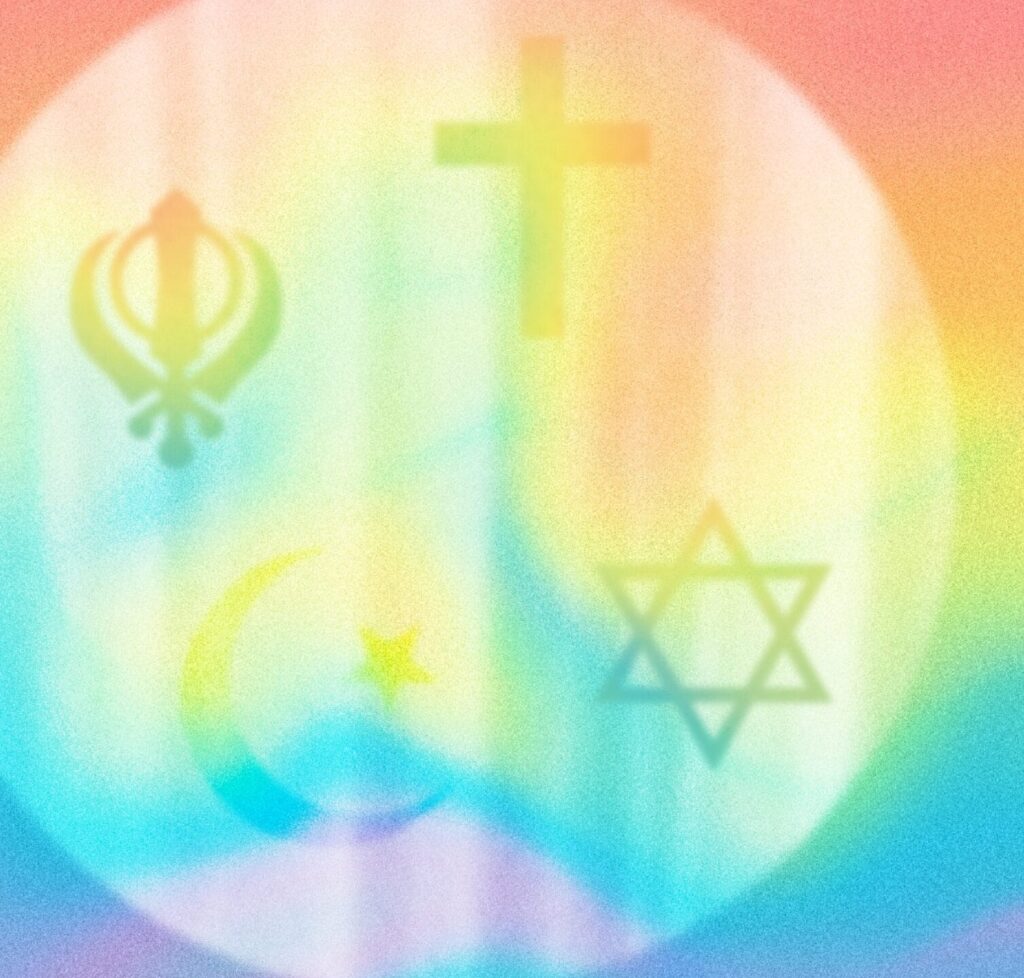Since June 1, 2022, GLAAD’s ALERT Desk has tracked 150+ anti-LGBTQ incidents targeting affirming faith-based communities in the US. These include 54 cases of vandalism, 38 cases of threats and harassment, 37 protests, 7 attempted arsons, 3 assaults, and 2 bomb threats.
For the access to the full dataset, please contact press@glaad.org.
This is an update to GLAAD’s original reporting in early 2024, showing 60+ anti-LGBTQ+ incidents targeting religious institutions. Since then, more than 90 incidents have come to light.
Nearly half of all LGBTQ Americans (48%) are religiously affiliated, according to a 2023 PRRI poll. This same study found that strong majorities of all Americans, including most people of faith, support nondiscrimination protections for LGBTQ individuals.
Notable Anti-LGBTQ Incidents Targeting Affirming Religious Communities
- 3/9/25: Multiple people made death threats against the First Congregational United Church of Christ in Park Ridge, New Jersey, after the local Moms for Liberty chapter posted about the church’s Pride flag and falsely claimed it supported “pedophilia.” One of the threats claimed that the church must be punished “with gasoline and a match.”
- 1/22/25: Multiple people sent death threats to Bishop Mariann Edgar Budde at the Episcopal Diocese of Washington D.C., following her sermon during President Trump’s inauguration where she called for mercy on LGBTQ and immigrant people.
- 9/7/24: A person vandalized the Pride-themed walkway leading to the Immanuel Congregational Church in Hartford, Connecticut. The graffiti read: “Fuck f****ts,” and occurred a week prior to the church’s Pride event.
- 8/17/24: A person tore down a Pride flag at the home of a local rabbi in South Whitehall Township, Pennsylvania, and blew it up with fireworks. They then x’d out the word “gay” on the flag with spray paint.
- 7/28/24: A person stole Pride flags and left anti-LGBTQ letters at two churches in Natick, Massachusetts. At First Congregational Church and Christ Lutheran Church, multiple Pride flags were damaged and replaced with a banner that read: “Jesus is King.”
- 6/17/24: A person was arrested for planning a mass murder targeting LGBTQ people, religious institutions, hospitals, schools, and supermarkets in Owosso, Michigan. Police reported that they found an Israeli flag in the suspect’s home with the words “anti-Jew f****t killer” and “death to you all.”
Despite the fear these incidents aim to inspire, they instead shed light on the heroic figures at the head of these groundbreaking and affirming faith-based communities. The ALERT Desk sat down with leaders from across the religious spectrum to speak about their experiences with anti-LGBTQ hate and how they overcome it to serve all people.
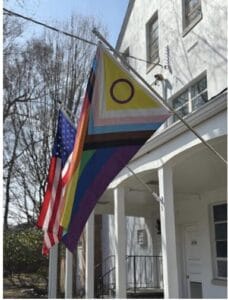
“We are caught in an inescapable network of mutuality, tied in a single garment of destiny. Whatever affects one directly affects all indirectly.” – Martin Luther King, Jr.
These are the words that Rev. Mark Suriano used to open his sermon at the First Congregational United Church of Christ, the Sunday after his church received death threats regarding their Pride flag.
Rev. Suriano continued: “I have always loved [this] quote from Martin Luther King Jr., in theory. When he speaks of ‘an inescapable network of mutuality’ and ‘a single garment of destiny,’ my heart has always warmed. But this past week, I, for the first time, had the most palpable sense of these ideas in action… It was a weekend of terror, grief, and [exhaustion.] But, in the midst of all that, the outpouring of support far surpassed the hateful and violent rhetoric against us.”
“I remain emotional about this physical manifestation of the ‘inescapable network of mutuality’ and the ‘seamless garment of destiny’ of which Martin Luther King, Jr. spoke. I also am overwhelmed by the beautiful truth that what affects one of us directly affects all of us indirectly.”
Presiding Bishop Elizabeth Eaton of the Evangelical Lutheran Church in America (ECLA) echoed Rev. Suriano’s sentiments. “Bullying and discrimination have no place in the body of Christ, but, sadly, reminders are still needed. Jesus’ command that we love one another does not come with a caveat about who we are to love. Recent acts of violence at churches that affirm the LGBTQIA+ community and the congregations’ supportive ministries must not be tolerated. As a church, we must be even more committed to lifting up the dignity, safety and humanity of our LGBTQIA+ siblings or we will be worse off as a church and as a nation.”
Rev. Terri Steed Pierce, an out pastor at the Joy Metropolitan Community Church in Orlando, Florida, has faced her fair share of hate, including demonstrators trying to disrupt her Sunday service in recent weeks. She summed it up neatly: “We say ‘all people are welcome here,’ but all behaviors aren’t and that means those that come with hate… Those who have a problem with that can take it up with Jesus.”
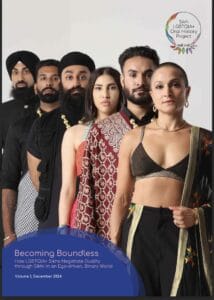
prabhdeep singh kehal leads the Sikh LGBTQIA+ Oral History Project and has seen firsthand the power of having religious leaders condemn anti-LGBTQ hate. “Working with LGBTQIA+ Sikh voices is an honor and one of the most rewarding experiences I have had in my life,” says kehal. “In a time when governments are using LGBTQIA+ communities as fodder to consolidate their own conservative, theocratic agendas, it is queer and trans affirming spaces that keep the energy to fight back going. And that is why politicians and conservatives target the places of safety for which we have fought to create – within and outside faith-based spaces.”
“Faith leaders are at an important position in challenging these pathologizing, theocratic interpretations of LGBTQIA+ lives because ‘God’ is being used again to turn an entire group of people into a target for those already in power… Their voices and positions are needed and that is why they are being targeted, because affirming and supporting faith leaders are able to speak back against claims that the Divine advocates for harming LGBTQIA+ beings.”
Ravjot Mehek Singh, a queer Sikh activist and award-winning filmmaker, added on: “As a Sikh in post 9/11 America, the racist attacks I experienced growing up in a predominantly White community left me traumatized and in doubt of my own identity. With my queerness, I get attacked oftentimes by my own community of conservative Sikhs, especially online where I am constantly doxxed and my videos collect thousands of hateful, violent comments. Because of my intersectional identity, I switch between facing threats from Americans and my own community – creating an often endless loop of hate… But Sikhi was founded to include all people regardless of gender or social standing, and I hope that the work I do alongside other brilliant advocates helps push for that equality to be acknowledged in its truest form.”
“There is no right way to be queer, there is no right way to be Sikh, there is no right way to be American, and anyone who tries to silence the way you exist in this world is a victim that is unable to comprehend the incredible multitudes that you contain. There is no rulebook to existing as oneself, so pursue all the things that make you feel whole.”
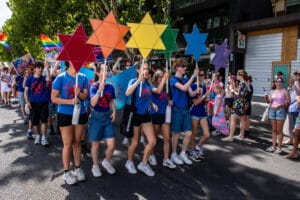
As President & CEO of Keshet, a national LGBTQ Jewish organization, Idit Klein knows all too well what it’s like to be at the intersection of communities under attack. “It has been an especially painful and complex time for American Jews in the wake of the October 7th Hamas attacks, the ensuing bloodshed and suffering in Israel and Gaza, and rising antisemitism here in the U.S. It also is an increasingly dangerous time for LGBTQ+ people as we face growing attacks on our rights and protections across the country. Against this backdrop, Keshet believes that remaining connected to each other across identities and movements is more important than ever.”
“As an organization committed to the full equality of LGBTQ+ Jews, we know that we cannot ever separate these parts of ourselves,” said Klein. “We work for a world free of homophobia, transphobia, and antisemitism. We work to find meaning and strength in this painful moment as many of us navigate rupture, uncertainty, and fear, whether in political spaces in our Jewish communities, and/or LGBTQ+ spaces.”
Keshet’s Bay Area Education and Training Manager Rabbi Eliana Kayelle spoke powerfully to how LGBTQ Jews can find hope in these challenging times. “As a trans queer Jew this moment has me feeling the legacy of resilience deep in my bones. I’m thinking about Jewish ancestors. Miriam who, while under Pharaoh’s rule, held onto hope, planning for liberation by crafting instruments she would eventually use to dance out of Mitzrayim. Emma Goldman and Hannah Arendt, who remind me of the importance of action even when circumstances look bleak. These ancestors remind me that hope is not false optimism — it’s the desperate and powerful force that lives in our guts, the feeling that can move us to fight to repair a broken world.”
“I’m holding onto queer and trans ancestors and changemakers, especially trans women of color, drag queens and butches, who laid the groundwork for the queer liberation movement. The ones who became leaders because they had to. It is because of their work that I can shout: ‘I am here and I’m not going anywhere no matter how hard you try!’ I think of Miss Major Griffin-Gracy saying: ‘I don’t need their permission to exist; I exist in spite of them…we have a history, we have a reason to be here. We have a purpose.’ And I think: Yes.”
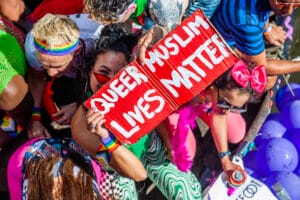
As President of Inter-Intra Community, Malik Johnson ministers to incarcerated Muslims, including those who identify as LGBTQ. “Someone might write in and say, ‘I’m a gay man who wants to be a part of the Muslim community in my [prison] facility, but I cannot because the others said that you cannot be gay and Muslim, and they will not let me pray with them. I feel very isolated from people and from the religion itself.’ Another might ask me, ‘What does it say in the Quran about me being trans?’”
“The beautiful thing is that the Quran doesn’t mention how queer a person has to be or not be to be sentenced to a heaven or a hell,” Johnson stated. “Instead the Quran relays [its message] in terms of action. What are your actions? What are you doing with your life? How are you treating other people?”
“Everyone has their own interpretation of what the Quran could mean. So I instead respond [to these questions] by addressing the heart. The first thing I say is ‘you matter.’ I say, ‘Thank you so much for calling or writing in. You are the most important part of this community. You mean so much. You’re very special. You’re worth something. If for no one else, you mean something to me. I love you and your Creator loves you. Because if your Creator didn’t love you, then they would not have created you and they would not have brought us together.’”
“You’re giving authority back to that person when you ask questions of them. Take someone who is trans. They have their dead name, that they used pre-transition, and they have their living name or preferred name. If that person is incarcerated, their dead name is continuously said to them. But if someone were to say, ‘What’s the name that you would like to be called?,’ it gives a symbol of hope and understanding and compassion. It gives back to that person so now that person is the authority in themselves. And that’s powerful. The best way to have autonomy is to name yourself.”
As we enter the holy season for those of so many faiths – from the end of Ramadan and Passover, to the start of Easter and Vaisakhi – let us remember these courageous leaders, who recognize our shared humanity and advocate for the importance of our diverse identities in fighting hate for all. In the words of the Interfaith Alliance, “While there are a variety of theological understandings of human sexuality and gender, we can all unite around the belief that nobody should fear for their safety or face discrimination based on who they love or who they are.”

